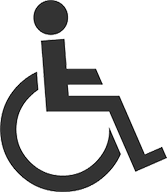Tax Deductions for the Disabled

Even if you're disabled, you're still subject to income tax on your income, except where exclusions apply.
If you retired while on disability, you are required to include the pension you received on your tax return. Disability income must be included in your wages until you reach the minimum age. Generally, this is the age when you are eligible to receive your regular retirement benefits for those who are not disabled. After this age, disability payments are taxed as pension/annuity. Some government and military disability pensions aren't taxed, though most disability pensions are subject to taxation. In addition to the pensions provided by the Department of Veteran's Affairs, public welfare worker's compensation payments, compensatory damages, permanent disfigurement compensation and accident and health insurance benefits are not taxed.
In order to determining the amount of taxable benefits from Social Security or tier 1 Railroad Retirement, the IRS adds half of your benefits to your total income, including tax exempt interest. If the resulting amount is equal to or greater than $25,000 ($32,000 jointly), then 85% of your benefits will be taxed.
If you employ someone in your home, meaning you pay them to perform a service and you tell them how the service should be performed, you'll be responsible for paying employment taxes such as Social Security and Medicare, as well as any unemployment tax.
If you want to reduce your tax liability, consider claiming deductions. To take a deduction, you have to fill out a Schedule A, Itemized Deductions. Medical expenses greater than 7.5% of your adjusted gross income can be deducted on a Schedule A as well. Such expenses include:
- Insurance premiums for long term care
- Specialized schooling or home for the disabled
- Prostheses
- Hearing aids
- Telephone equipment for the hearing impaired as well as other specialized equipment for communication
- Cost and care of a service dog
- Wheelchair costs
- Home improvements that do not affect the home's value, but are necessary to accommodate the disabled (ramps, support bars, specialized alarm systems, etc.)
You'll have to keep receipts for all your expenses in order to appropriately document them. Also, check your eligibility for elderly or disabled credits. Benefits received through your employer's disability retirement plan are added into earned income as calculated for the Earned Income Tax Credit (EITC). You may also be able to deduct any work-related expenses such as specialized care, or other items which help you to work.



